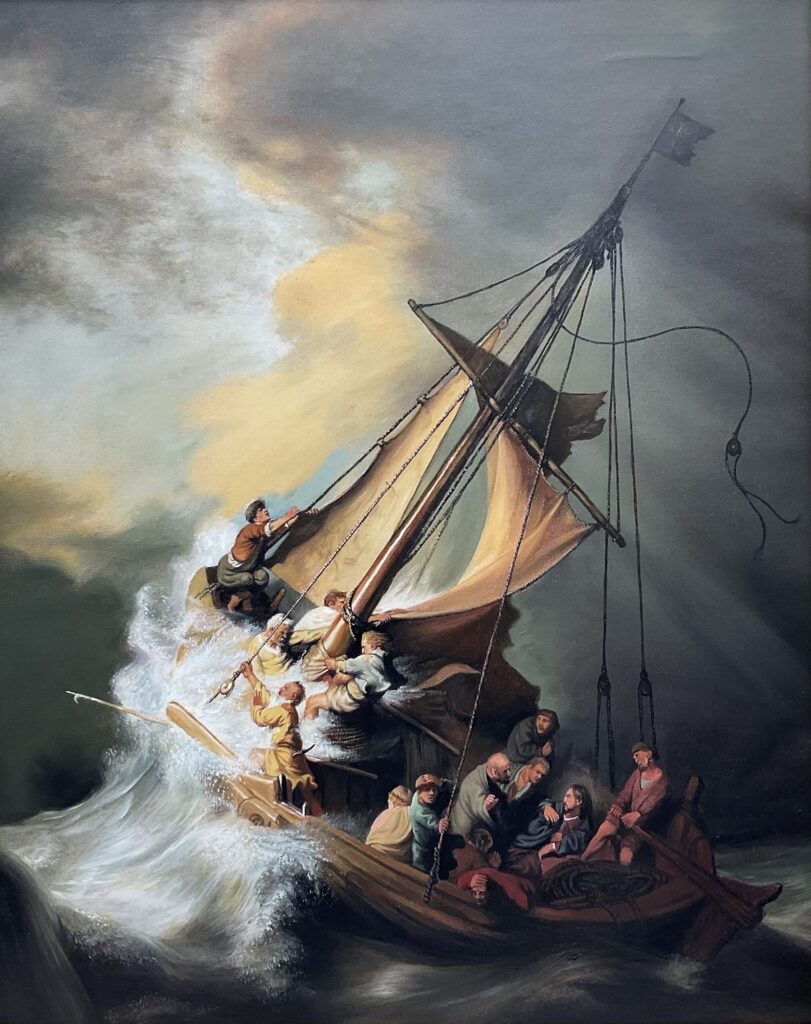Note: If you wish to receive, via e-mail, (1) my weekly newsletter or (2) daily copies of these posts, write to me at rrbates1951@gmail.com. Comments may also be sent to this address. I promise not to share your e-mail with anyone. To unsubscribe, write here as well.
Sunday
It took me years before I began thinking of Mary Oliver as a religious poet. Every Easter I used to share one of her poems, thinking it fortuitous that they fit the occasion so perfectly. Then I discovered that she was a practicing Episcopalian and that she wrote in the mold of what Harold Bloom has described as American Gnosticism. The tradition includes Ralph Waldo Emerson, Walt Whitman, Emily Dickinson and Hart Crane and includes ecstatic encounters with God—or, if you’d rather, with the soul at the heart of things—while immersed in nature.
I am therefore less surprised that I once would have been to come across an Oliver poem explicitly about Jesus–in this case, about Jesus calming the storm, which is today’s Gospel text. To set up the poem, here’s the reading from Mark (4:35-41):
When evening had come, Jesus said to his disciples, “Let us go across to the other side.” And leaving the crowd behind, they took him with them in the boat, just as he was. Other boats were with him. A great windstorm arose, and the waves beat into the boat, so that the boat was already being swamped. But he was in the stern, asleep on the cushion; and they woke him up and said to him, “Teacher, do you not care that we are perishing?” He woke up and rebuked the wind, and said to the sea, “Peace! Be still!” Then the wind ceased, and there was a dead calm. He said to them, “Why are you afraid? Have you still no faith?” And they were filled with great awe and said to one another, “Who then is this, that even the wind and the sea obey him?”
Maybe
By Mary Oliver
Sweet Jesus, talking
his melancholy madness,
stood up in the boat
and the sea lay down,
silky and sorry.
So everybody was saved
that night.
But you know how it is
when something
different crosses
the threshold — the uncles
mutter together,
the women walk away,
the young brother begins
to sharpen his knife.
Nobody knows what the soul is.
It comes and goes
like the wind over the water —
sometimes, for days,
you don’t think of it.
Maybe, after the sermon,
after the multitude was fed,
one or two of them felt
the soul slip forth
like a tremor of pure sunlight
before exhaustion,
that wants to swallow everything,
gripped their bones and left them
miserable and sleepy,
as they are now, forgetting
how the wind tore at the sails
before he rose and talked to it —
tender and luminous and demanding
as he always was —
a thousand times more frightening
than the killer sea.
I’m wondering if the image of the wind tearing at the sails is how, for much of our lives, we feel caught up in tempestuous storms, which we come to normalize. In the process, Oliver points out, we lose touch with our souls:
Nobody knows what the soul is.
It comes and goes
like the wind over the water —
sometimes, for days,
you don’t think of it.
At times, to be sure, we get glimpses of this soul—“a tremor of pure sunlight”—but then the moment passes and we are left, “miserable and sleepy” in our storm-tossed boats. Rather than changing our lives when we are saved–you’d think we would do this “when something different crosses the threshold”–we instead forget about it and return to our muttering and our knife sharpening. “You know how it is,” Oliver says with resignation.
What stays with us, however, is Jesus’s “tender and luminous and demanding” words to us, words that demand more of us that we think we are capable of. Are we really prepared to love God and to love our neighbor? “A thousand times more frightening than this killer sea,” the poet informs us, is this injunction, which comes from one who speaks with authority (“even the wind and the sea obey him”).
Will we rise to the occasion?
Maybe.


